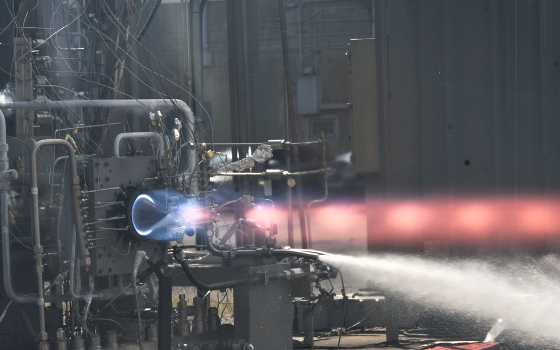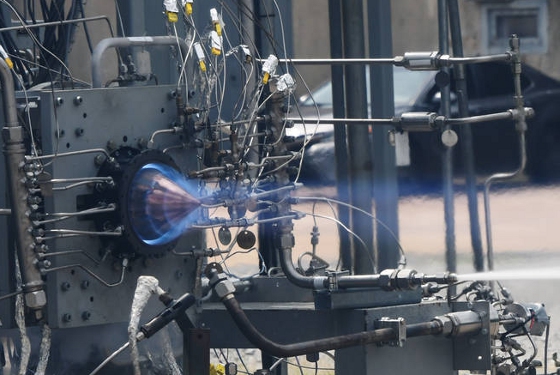 |
| January 31, 2023 | Volume 19 Issue 04 |
Designfax weekly eMagazine
Archives
Partners
Manufacturing Center
Product Spotlight
Modern Applications News
Metalworking Ideas For
Today's Job Shops
Tooling and Production
Strategies for large
metalworking plants
NASA validates rotating detonation rocket engine
-- revolutionary propulsion for deep space missions
By Ray Osorio
A team of propulsion development engineers at NASA has developed and tested the organization's first full-scale rotating detonation rocket engine (RDRE) -- an advanced rocket engine design that could significantly change how future propulsion systems are built.

Rotating detonation rocket engine, or RDRE, hot fire test at Marshall Space Flight Center. [Credits: NASA]
The RDRE differs from a traditional rocket engine by generating thrust using a supersonic combustion phenomenon known as a detonation. This design produces more power while using less fuel than today's propulsion systems and has the potential to power both human landers and interplanetary vehicles to deep space destinations, such as the Moon and Mars.
Engineers at NASA's Marshall Space Flight Center in Huntsville, AL, and primary collaborator IN Space LLC, located in West Lafayette, IN, are confirming data from RDRE hot fire tests conducted in 2022 at Marshall's East Test Area. The engine was fired over a dozen times, totaling nearly 10 minutes in duration.
VIDEO: Rotating detonation rocket engine test at Marshall Space Flight Center. [Credit: NASA's Marshall Space Flight Center]
The RDRE achieved its primary test objective by demonstrating that its hardware, made from novel additive manufacturing (3D printing) designs and processes, could operate for long durations while withstanding the extreme heat and pressure environments generated by detonations. While operating at full throttle, the RDRE produced over 4,000 lb of thrust for nearly a minute at an average chamber pressure of 622 psi, the highest pressure rating for this design on record.
The RDRE incorporates the NASA-developed copper-alloy GRCop-42 with the powder bed fusion additive manufacturing process, allowing the engine to operate under extreme conditions for longer durations without overheating.

RDRE hot fire test at Marshall Space Flight Center. [Credits: NASA]
Additional milestones achieved during the test include the successful performance of both deep throttling and internal ignition. This demonstration brings the technology closer to being used with future flight vehicles, enabling NASA and commercial space to move more payload and mass to deep space destinations, an essential component to making space exploration more sustainable. Because of NASA's recent success with the RDRE, follow-on work is being conducted by NASA engineers to develop a fully reusable 10,000-lb class RDRE to identify performance benefits over traditional liquid rocket engines.
RDRE is managed and funded by the Game Changing Development Program in NASA's Space Technology Mission Directorate.
------------------
BONUS U.S. Air Force video
What's a rotating detonation rocket engine? According to Capt. Tylor Rathsack, Deputy Branch Chief, Rocket Propulsion Div., Air Force Research Lab, a rotating detonation rocket engine uses detonation instead of deflagration (slow, predictable burning) to burn fuel -- a whole new ballgame for rocket design. Watch Rathsack's in-depth presentation below.
------------------
Learn about more NASA Space Tech developments at nasa.gov/topics/technology/index.html.
Published January 2023
Rate this article
View our terms of use and privacy policy
